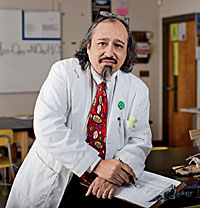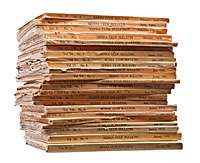sierraclub.org - sierra magazine - may/june 2011 - bulletin
By Della Watson
Grilled | 150 & Counting | Explore, Enjoy, and Protect the Past
GRILLED
Invading the Privacy of the People Who Make the Club Tick
 Kristina Krug
Kristina Krug
Cliff Cockerham
Nashville, Tennessee
Science teacher, Tennessee Chapter education chair, Environmental Justice Committee chair, Sierra Student Coalition liaison, Water Sentinels activist
One way is the cry for environmental justice—to right the wrongs. That appeals to many of my students. We're 85 percent below the poverty level, and very few kids have both parents. Employment is another motivator. We're the first school in the state with a green-jobs internship placement. The students learn how to do home energy audits and efficiency-improvement projects and gasoline-to-electric-car conversions.
Oh yeah. As much as I like it here, I haven't totally gotten with the program. I think sometimes I'm still a bull in a china shop. But then, in many ways, everyone in the Sierra Club is kind of rocking the boat. Activism is not always comfortable for local culture.
When I was in high school, we got this kit from the National Science Foundation for studying different kinds of pollution. I started doing research projects with it.
Studying it, yeah.
At this point, everything I'm doing is with my students. We have a lot of different research projects going. We're working on fuel efficiency, preparing biodiesel from vegetable oil, producing cellulosic ethanol as a fuel, and growing switchgrass. A couple of kids are looking at algae as a feedstock for biofuels.
I'd rather have 1 percent of the revenues. But I guess I'd settle for a naming.
Ah, well there's the Sierra Club. [Laughs] We have two group retreats that are kind of nice getaways. My daughter, who is 17, actually invited me to go WWOOFing [worldwide opportunities on organic farms] with her. We're going to volunteer on an organic farm in southern Ireland this summer.
I said to her, you know, I'd much rather lecture about this, maybe do some studies, generate graphs, do talks. Instead, we're going to get our hands dirty and our feet wet.
Yeah, I actually was pretty touched by that. We'll be in Ireland for two weeks, then we're going to head over to England and check out the lives of the Beatles. Follow in their footsteps. Find Abbey Road.
Exactly. —interview by Della Watson
Watch a video of Cliff Cockerham and his students at sierraclub.org/people/cliff.
150 & Counting
 iStockphoto/SilkenOne
iStockphoto/SilkenOne
The Sierra Club's Beyond Coal Campaign celebrated an important milestone in February:
The 150th coal-fired plant has been defeated or abandoned since 2001. For details, go to sierraclub.org/coal/150plants.
Explore, Enjoy, and Protect the Past
 Lori Eanes
Lori Eanes
You may think that the 118-year-old issues of
Sierra Club Bulletin (as
Sierra was previously called) are sitting around gathering dust. But they're actually getting a new life online. The first 12 volumes (1893–1924) were recently scanned and archived by the Internet Archive. The digital issues feature accounts of hikes and camping trips written by legends like John Muir, Joseph N. LeConte, and William E. Colby. Rugged outdoorsmen weren't the only ones to leave their mark on Bulletin's early pages: Harriet Monroe, the founder of
Poetry magazine, also penned a few lines for the Club. And the old ads are hilarious.
"A lot of people know about the Sierra Club, but few of them know what a long history the Club has," says Club librarian Ellen Byrne. The scanned issues represent some of the few remaining periodicals from the Club's early days. "Everything that was in the Sierra Club office burned in 1906, in the San Francisco earthquake and fire," Byrne says. "It's pretty rare to find the early Bulletins."
Find a link to the Internet Archive's digitized issues and a 57-year index of Bulletin authors at sierraclub.org/history/bulletin.